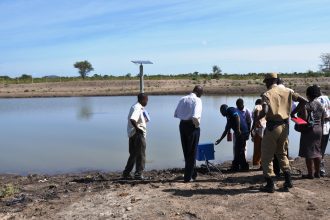By Steven Masiga
President Moi knew the psychology of his people well. He would arrive at every political rally with cars well-loaded with fresh bread and powdered milk. He understood the mindset of most Kenyans, which is why he faced limited resistance from his political enemies.
Each country has its own political behavior. In Europe, a candidate trying to woo voters with goodies such as salt, sugar, etc., could be arrested by the voters themselves. In Africa, however, voters will chase away a candidate who arrives at a political rally empty-handed, viewing them as a bad-hearted person who has no concern for their people and, thus, is unfit to occupy a public office.
The psychology of most African voters is rooted in food and not services. Those who promise to deliver services after winning an election will lose, while those who promise to bring food, as well as things like salt, sugar, and chapatis, will win. That being the case, politicians must carefully balance their approach. If they focus only on food, they risk sinking deep into failure. As you bait voters with food, you must also have a development agenda that focuses on roads, health, education, and other core sectors.
Politicians cannot merely be elected to feed the population. Other programs, such as education, health, and infrastructure, are crucial to spurring economic development. Political data suggests that winning an election in an African country often depends on addressing the basic needs of citizens—food, sugar, salt, posho, clothes, and drinks such as malwa and waragi. Additionally, attending burials is seen as essential, especially if you want to be elected as a Local Council III (LCIII) chairman, LC V chairman, or Member of Parliament.
Many cunning politicians, in order to attract the attention and sympathy of their gullible voters, choose to arrive during heavy rains, triggering landslides, or even appear with a medical cannula on their hands to create the impression that they were once on a hospital bed but valued the deceased so much that they came anyway.
In the absence of other research on what conditions voters to elect someone to public office, I recommend that the above-mentioned basic needs be considered serious bait for any electoral success. Radically, we must find a way of ensuring citizens vote for a person based on better parameters, such as being a good debater, a good policy formulator, having a solid education, etc., which can spur national economic development and well-being, rather than focusing on the petty needs of individuals.
The National Electoral Commission has the important task of undertaking serious voter sensitization to eliminate this rural mindset. Due to the failure to meet voters’ petty needs, the country has lost out on capable leaders, and instead, wrong people have been elected to office. Therefore, it is a serious clarion call for every Ugandan to renounce the politics of food and push for politics centered on national development.
The begging voters are responsible for the poor conditions of their politicians and should be held accountable. Many times, politicians avoid disseminating important information to their voters out of genuine fear that voters will demand cash. Many choose to hide or at least wait until they have been paid some emoluments. This kills democracy in the country, and the practice of holding politicians to ransom for money should stop.
Many Ugandans, after losing their loved ones, will begin by placing radio announcements inviting strangers, such as MPs, LC V chairmen, and RDCs, before mentioning relatives as a footnote. In normal bereavement, one would update the relatives of the deceased first, not “foreigners.” Non-relatives should be the last ones invited, but alas.
The writer is a national researcher from Mbale.




















